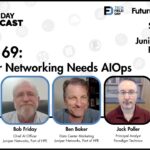Jack Poller discusses the shift of endpoint computing to the browser in a recent article, highlighting how traditional security tools are lagging behind in adapting to this change. He explains that as applications and user data migrate from desktops to web platforms, the paradigm for security must evolve to address new vulnerabilities and threats. This was the topic of the SquareX presentation at Security Field Day. For more coverage on this topic, follow Jack Poller on LinkedIn.
Why Your GPUs Are Waiting: The Data Speed Problem in AI Workloads
In this insightful article by Jack Poller, the focus is on the frequently overlooked issue of data speed bottlenecks that significantly hinder GPU performance in AI tasks. Poller explains how the inadequate pace of data delivery to GPUs can lead to underutilization, slowing down the process despite the rapid computational abilities of GPUs. Explore further coverage of Hammerspace at AI Infrastructure Field Day on LinkedIn!
How CTERA Plans to Fix What’s Breaking Enterprise AI
CTERA is tackling the complexities that hinder enterprise AI by enhancing data management and storage solutions, ensuring robust and scalable infrastructure. By focusing on fixing bottlenecks related to data accessibility and management, CTERA aims to streamline operations and support advanced AI deployments. For more coverage of CTERA’s initiatives, follow updates by Jack Poller and others on Techstrong AI.
The AI Infrastructure Paradox: When Buying GPUs Is Just the Beginning
Rafay is an AI cloud enabler that automates the AI stack, simplifying infrastructure orchestration and reducing costs for large enterprises. It offers multi-tenancy, standardization, and application-centric delivery, empowering organizations to operationalize AI without extensive internal development. Watch for more coverage of AI Infrastructure Field Day on LinkedIn!
How Broadcom’s Three-Chip Strategy Tackles AI’s Biggest Networking Bottleneck
Broadcom’s innovative three-chip strategy addresses significant networking bottlenecks in artificial intelligence (AI) by optimizing data movement efficiency across different network layers. Utilizing a combination of its Tomahawk, Jericho, and Ramon chips, the strategy enhances compute and storage connectivity, ensuring faster and more reliable data handling essential for AI applications. Find more coverage of AI Infrastructure Field Day by Jack Poller, watch Techstrong AI!
The Evolution of Cloud at Cloud Field Day 24
Cloud Field Day 24 is back in San Francisco on October 22nd and 23rd, bringing the brightest minds in enterprise cloud together for two days of innovation, insight, and live demos.
From GPU Gold Rush to Revenue Reality: How Mirantis k0rdent Transforms AI Infrastructure Dreams into Dollars
In the fast-evolving world of artificial intelligence, Mirantis is making waves with its k0rdent platform, revolutionizing how businesses capitalize on GPU-intensive workloads. This transformative tool not only optimizes AI infrastructure but also significantly enhances the operational efficiency and revenue streams of enterprises engaged in AI and machine learning endeavors. Additional insights and coverage on this topic have been provided by Jack Poller on Techstrong AI.
VMware Cracks the Code: VCF 9.0 Delivers Enterprise Security Without Operational Sacrifice
VMware has introduced VCF 9.0, which significantly enhances enterprise security while maintaining operational efficiency. This new release integrates advanced security measures directly into its operational framework, ensuring that robust security is a seamless aspect of business functionality. For more coverage of the innovations in VCF 9.0, you can follow updates and analyses by Jack Poller on Security Boulevard.
The AI Memory Crisis (And How One Company Thinks They’ve Solved It)
As enterprises increasingly deploy AI applications, they face a significant bottleneck due to the limitations of conventional memory architectures. In response, Phison claims to have developed a solution that addresses this critical “AI Memory Crisis” by enhancing memory efficiency and scalability. Discover additional insights about AI Infrastructure Field Day 2 in our coverage on LinkedIn Pulse featuring Jack Poller.
Datacenter Networking Needs AIOps with HPE Juniper Networks
Enterprise networking is too large and complex, we need AI Operations. This spotlight episode of the Tech Field Day podcast features Bob Friday and Ben Baker, both from Juniper Networks, with Jack Poller and Alastair Cooke. Modern enterprise networks reach far beyond the well-controlled walls of data centres and corporate buildings. The rate of change enabled by public cloud platforms makes an enterprise network highly dynamic. Access to cloud and on-premises applications over the Internet means your users are dependent on many network elements outside of your control. Bob founded Mist Networks to help businesses manage the complexity of user-to-cloud networking. Juniper Networks acquired Mist, and now HPE has acquired Juniper. I don’t think he is alone in seeing the necessity of using AI to manage complex and critical networks. Yet new tools always bring new challenges; the cost of AI infrastructure may be a concern, and Generative AI has challenges with hallucinations. The security and governance practices around AI tools are still developing, and the non-deterministic nature of AI needs careful consideration.
The AI Infrastructure Bottleneck No One Talks About
Jack Poller sheds light on the seldom-discussed AI infrastructure bottleneck, highlighting the limitations in current technologies that could potentially hinder AI applications’ effectiveness. He explores the complexity of balancing computational power, data storage capacity, and network capabilities to optimally support AI workloads. For more insights on Netris, you can check out additional coverage from Security Field Day 13 on LinkedIn Pulse.
Enterprise AI Gets a Storage Upgrade: MinIO AIStor Scales from Labs to Production at Exabyte Scale
Jack Poller explores MinIO’s latest enterprise AI storage solution, AIStor, which promises scalability from small lab environments to large-scale production at an exabyte level. He highlights its architectural innovations and potential impact on accelerating AI workloads efficiently. For additional insights into Cloud Field Day 23, visit Techstrong AI’s extended coverage.
HPE Takes Aim at IT Operations Chaos with OpsRamp Platform
In a recent insightful piece, Jack Poller discusses HPE’s strategic move to address the complexities of IT operations through its OpsRamp platform. The platform is designed to enhance visibility and control across diverse IT environments, aiming to streamline operations and reduce inefficiencies. For further insights on Cloud Field Day 23, explore additional coverage by Jack Poller.
Beyond the Perimeter: Dell’s Three-Pillar Defense Against Modern Cyber Threats
In his latest analysis, Jack Poller examines Dell’s strategic approach to combatting modern cyber threats through a robust three-pillar defense mechanism. Highlighting innovations in predictive analytics, endpoint security, and cloud protection, Poller sheds light on how Dell’s integrated solutions are designed to enhance organizational resilience in today’s complex security landscape. For additional insights from Security Field Day 13, follow Jack Poller’s coverage on LinkedIn Pulse.
David vs. Goliath in AI Hardware: Signal65’s Independent Tests Reveal Gaudi 3’s Surprising Edge
Following the Futurum presentation at Cloud Field Day, Jack Poller examines the performance benchmarks of Habana Labs’ Gaudi 3 AI processor, revealing its competitive advantage over industry giants in AI hardware. Signal65’s independent testing highlights Gaudi 3’s enhanced processing capabilities, which could reshape expectations within the AI technology landscape. Find more coverage of Cloud Field Day 23 by visiting Techstrong IT and AI.
Fortifying Defenses: Veeam’s Comprehensive Approach to Cyber Resilience
Jack Poller offers a comprehensive review of Veeam’s enhanced cybersecurity measures, illustrating a multi-layered approach aimed at increasing an organization’s cyber resilience. He discussed key enhancements like improved data protection capabilities and the integration of proactive measures to prevent data breaches. You can read more of Jack Poller’s analyses from Security Field Day 13 on LinkedIn Pulse.
Breaking Free from Hardcoded Security: Microsoft Introduces Human-in-the-Loop AI Agents
Microsoft has unveiled a groundbreaking innovation in cybersecurity with their introduction of human-in-the-loop AI agents, designed to transcend traditional hardcoded security practices. These AI systems feature advanced capabilities to analyze and respond to security threats dynamically, incorporating human oversight for heightened accuracy and adaptability. For additional insights into Security Field Day 13, explore Jack Poller’s comprehensive analysis on LinkedIn Pulse.
Uncompromising Network Visibility: How cPacket Augments Security with Advanced Telemetry and AI
Jack Poller recently dissected how cPacket Networks is enhancing security in today’s enterprises by integrating advanced telemetry and AI into their network solutions. His analysis illustrates how cPacket’s sophisticated tools provide an unrivaled clarity and insight, allowing for proactive threat detection and management. For additional discussions and insights from Security Field Day 13, follow Jack Poller’s coverage on LinkedIn Pulse.
Breaking the AI Storage Bottleneck: Solidigm’s Strategic Approach to Each Pipeline Stage
Jack Poller provides an insightful analysis into how Solidigm is addressing the AI storage bottleneck by strategically catering to each stage of the data pipeline. He explores the technological advancements and solutions implemented by Solidigm that enhance both the efficiency and effectiveness of AI data processing. For more in-depth analysis on AI Infrastructure Field Day 2 by Jack Poller, visit Techstrong AI.










